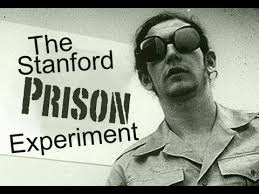Written by Adam Mast
THE STANFORD PRISON EXPERIMENT (R)

Director Kyle Patrick Alvarez follows up the under appreciated “Easier With Practice” and the Sundance hit “C.O.G.” with his strongest film to date, a provocative drama called “The Stanford Prison Experiment.” I saw this picture back in January at the Sundance Film Festival, and I haven’t been able to shake it from my mind.
“The Stanford Prison Experiment” is a claustrophobic, effectively discomforting reenactment of an early ‘70s behavioral experiment that would find respected psychologist Philip Zimbardo (played by Billy Crudup) recruiting a handful of young adults and having them assume the roles of guards and prisoners at a mock prison constructed in the basement of Stanford over the course of a two-week period. Why? To study the effects of abuse from the point of view of both the abusers and those taking the abuse.
As the film opens, Zimbardo and his team screen potential test subjects. They decide who will be guards and who will be prisoners not by way of a psychological profile, but by a mere flip of a coin. What follows is an unnerving descent into hell as these test subjects appear to lose sight of their surroundings after a very short period of time.
Crudup is terrific here as the in-over-his-head Zimbardo, while Nelsan Ellis (Lafayette Reynolds of “True Blood”) is solid as Jesse Fletcher, an ex-con brought in to insure the authenticity of the experiment. As strong as both actors are, it’s the young performers playing the guards and prisoners who are most worth noting. Michael Angarano is fiercely intense—and chilling—as Christopher Archer. This “Art of Getting By” and “Almost Famous” co-star appears to be channeling a redneck policeman straight out of “Cool Hand Luke,” and he wastes no time flaunting his power in a performance that is as perversely funny as it is terrifying. Equally effective are Tye Sheridan and Ezra Miller as “prisoners” who quickly find the line between fantasy and reality blurred.
Alvarez has fashioned a thought-provoking morality tale in “The Stanford Prison Experiment.” This is a solid dramatization of a real event, and when I initially read about it, I found it hard to believe that these test subjects would be so quick to lose themselves in the experiment at hand. Alvarez and his expert cast were able to convince me otherwise in a movie that plays like a simulated version of “Lord of the Flies.” I really got sucked into the horror and chaos of it all.
In the end, “The Stanford Prison Experiment” is a hard-hitting expose on the abuse of power and an intimate look at the fragility of the human brain. It’s intense viewing, but highly recommended.
“The Stanford Prison Experiment” opened in limited release on July 17. Given that I’m a huge proponent of the theatrical experience, I suggest you see it in a theater. Having said that, if it isn’t playing in your neck of the woods, it will be available for viewing via VOD on July 24.




